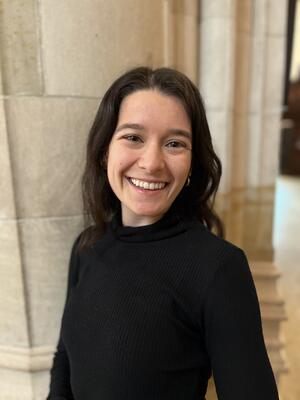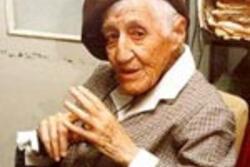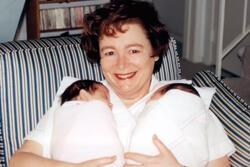Where Are They Now? RVF Alum Isabel Kirsch
To celebrate the 10th anniversary of JWA’s Rising Voices Fellowship (RVF), we’re running a series of interviews with RVF alums. Isabel Kirsch, from the 2016-2017 RVF cohort, graduated from Yale last spring and is now a Fulbright fellow in Paris.
JWA: Tell us about your experience participating in the fourth cohort of the Rising Voices Fellowship in 2016-2017.
Isabel Kirsch: I had a fantastic time participating in RVF during my junior year of high school. I especially loved our in-person retreats, but I also looked forward to reading my friends’ [blog] posts and seeing the varied ways that we all responded to the same prompt. One of my favorite memories was a book swap at our winter retreat. Everyone brought a favorite book—all genres and categories accepted—and we got to choose and take home one of the new recommendations. I loved that introduction to new authors and the joy of talking about books with Jewish, feminist friends!
JWA: What were the impacts of RVF on your high school self?
IK: I felt much more confident and self-assured in my feminist identity than in my Judaism going into RVF and remember being a bit nervous going in about my lack of traditional Jewish education. I found it more natural to write about feminist issues than to seek out and find the intersection between my Jewish and feminist identities, so part of what I found most meaningful about RVF was meeting friends from around the country from such different Jewish backgrounds and seeing those perspectives reflected in our writing. RVF introduced me to authors, intellectual traditions, and friends that linked my Judaism and feminism in new ways.
JWA: How has RVF continued to influence you as an adult?
IK: I owe it to RVF that I continue to seek out Jewish, feminist communities. I didn’t feel nearly as connected to Jewish life at home, but RVF encouraged me not to give up on Jewish spaces. When I arrived at college in 2019, I immediately knew that I wanted to engage with Jewish student life, and I even met multiple generations of RVF alums within my first few months on campus. RVF also gave me the opportunity to conduct an oral history project with my grandmother that launched me into a whole new academic world of studying French and venturing into French archives in search of details about my family’s history. I am so thankful for that encouragement.
JWA: You worked for US Representative Elissa Slotkin’s campaign and congressional office before college, and have continued to be involved in political organizing, particularly with students. What political issues do you think are most important to young people today?
IK: I say this with the caveat of currently living outside the United States and not having an on-the-ground sense of our political moment, but I’m both encouraged by young people’s political engagement and concerned by what I see as very real threats to our democracy likely on the ballot in November. The escalating humanitarian crisis in Gaza is top of mind for many politically engaged young people, alongside rising antisemitism in the United States and abroad, reproductive rights, and a litany of other issues. While it doesn’t make the news as much, I’m also committed to transit and housing policy, often more at the local or state level, and would love to keep momentum building on improving public transportation and reforming our zoning codes. I see these issues as levers to address racial justice, climate change, and so many other structural problems that literally shape the world around us.
JWA: As a Fulbright fellow in Paris, you’re researching the legacy of history in urban spaces, focusing on the Holocaust transit camp Drancy, which is now an apartment complex. Can you tell us a bit about what you’ve learned so far?
IK: I’ve been reading about relationships between Algerian Jews and Muslims living together in Parisian suburbs after Algeria’s independence, postwar French public housing policy, the role of urbanist theorists in envisioning what a city should be and whom it should serve, and the politics of French Holocaust commemoration. The Cité de la Muette, the famed and modern 1933 apartment complex in the Parisian suburb of Drancy that later became a notorious Holocaust transit camp, sits at the intersection of these topics. Right now, I’m working my way through a range of archived documents about the demolition of a section of the site in 1976. It’s been fascinating to see how the building’s architect, writers in architectural reviews, engineers, and representatives of the Ministries of Culture and Defense used this inflection point to shape completely different narratives of what the site meant and should mean to future visitors—architecturally, culturally, militarily, and, in notable exceptions, with regards to Holocaust memory.
JWA: What has your experience been living as a Jew in Paris?
IK: I was excited to discover that I live only a few blocks away from the congregation of France’s first woman rabbi and was shocked to realize just how discreet the synagogue is, compared to both what I’m used to in the United States and to the giant neighborhood church across the street. Parisian Jewish life feels hidden in plain sight—it’s there when I know what cues to look for, but I imagine it would be possible to exist in Paris without having any knowledge of a Jewish presence if you weren’t looking for one. The young French Jews whom I’ve talked to about this difference between France and the US all attribute the discretion to French antisemitism and the fear of being identifiably Jewish in public; that’s why, for example, so many observant men wear baseball caps over their yarmulkes, I was told at a group Shabbat dinner. I’ve felt safe and comfortable [as a Jew], but I also haven’t experienced the education system and workplace in the way that French Jews have, nor do I wear anything that externally marks me as being Jewish, so I don’t want to minimize the insecurity and enforced insularity that seems to mark French Jewish communal life in an upsetting way.
JWA: What advice do you have for young people discovering their Jewish and feminist identities?
IK: Keep reading, and seek out communities—like RVF!— that will encourage you to ask questions and articulate your views. Look for events (book talks, guest lectures, social groups) that might introduce you to new people with similar interests, and go from there!
This piece was written as part of JWA’s Rising Voices Fellowship.







